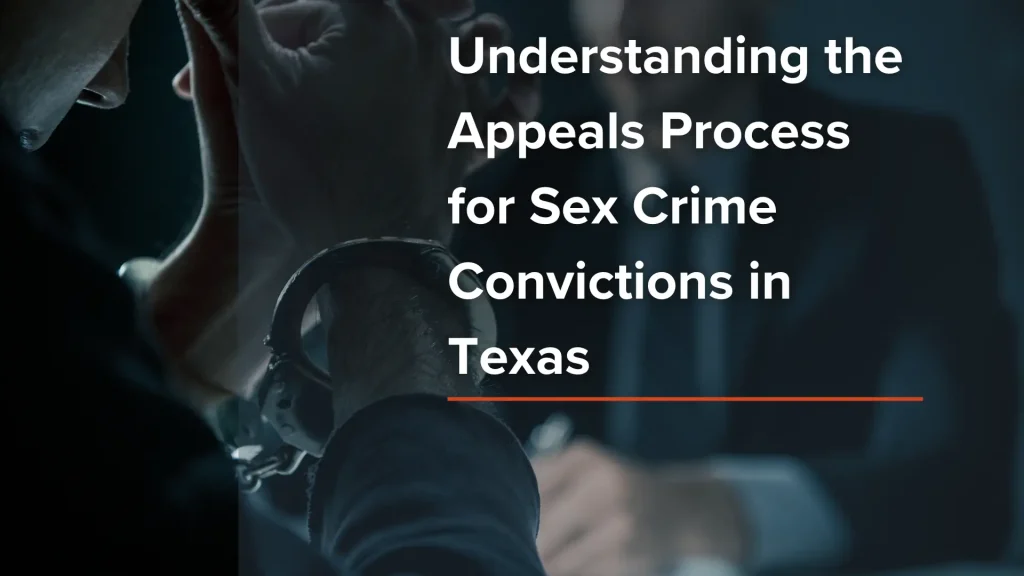 Following a sex crime conviction in Texas, a defendant may pursue an appeal to challenge their conviction by proving that errors in the trial court proceedings influenced the case’s outcome. Understanding the appeals process in Texas can help defendants prepare and pursue an effective appellate strategy. Learn more about sex crime conviction appeals in Dallas, Texas.
Following a sex crime conviction in Texas, a defendant may pursue an appeal to challenge their conviction by proving that errors in the trial court proceedings influenced the case’s outcome. Understanding the appeals process in Texas can help defendants prepare and pursue an effective appellate strategy. Learn more about sex crime conviction appeals in Dallas, Texas.
What Is a Criminal Appeal
A criminal appeal allows a convicted defendant (or, in rare cases, the government) to challenge various trial court errors that led to an adverse outcome for the party filing the appeal. Contrary to some people’s perception, a criminal appeal does not allow defendants to retry their case to a different court. Instead, a defendant who files a criminal appeal must identify legal errors during the trial court proceedings that affected the case outcome. A successful appeal requires a party to identify a specific error or combination of errors by citing the record of the trial court proceedings and identifying statutory law or case law precedent that supports the finding that the trial court’s decision or action constituted a legal error.
Grounds for Appealing a Sex Crime Conviction
Common reasons for sex crime conviction appeals in Texas include:
Erroneous evidentiary rulings, such as improperly denying motions to exclude evidence from the prosecution’s case or admissions of hearsay evidence
Incorrect jury instructions
Arbitrary or unreasonable decisions by the trial court, such as overruling meritorious objections
Prosecutorial misconduct, such as withholding exculpatory evidence, excluding jurors based on protected characteristics (i.e., race, gender), or presenting false evidence/testimony
Juror misconduct, such as seeking evidence outside the trial or discussing the case outside jury deliberations
Denials of due process, such as denying a defendant legal counsel or preventing them from confronting the evidence and witnesses against them
The Process of a Criminal Appeal
A criminal appeal involves multiple steps. First, a defendant or their attorney must file a notice of appeal within 30 days of the judgment of sentence or 90 days if the defendant filed a motion for a new trial. The notice of appeal identifies the issues the defendant wishes to raise in their appeal. After filing a notice of appeal, the defendant must assemble a trial record for the appellate court, which includes the docket of the appellate court proceedings and transcripts of the trial or any relevant hearings.
The defendant also must file an appellate brief that argues, with citations to statutory or case law, how the trial court’s decisions constituted a prejudicial error. In most cases, the appellate court will schedule a hearing for the parties to present oral arguments and answer questions from the appellate panel. After the oral argument, the court will consider the parties’ briefs and arguments and make a decision.
Outcomes of the Sex Crime Appeal Process
The outcome of an appeal of a sex conviction will depend on whether the appeals court agrees that the lower court made an error. When the appeals court finds no error by the lower court or determines that the lower court’s error did not affect the case’s outcome, the appeals court will affirm the lower court’s judgment and deny the appellant’s appeal. However, when the appeals court agrees that an error occurred in the lower court proceedings that affected the case’s outcome, it can reverse or vacate the lower court’s judgment and order various forms of relief depending on the error, such as:
Ordering a new sentencing hearing if the trial court imposed an illegal sentence or abused its sentencing discretion
Ordering a new trial if errors during the trial or pre-trial proceedings affected the verdict
Remanding (returning) the case to the trial court with instructions to dismiss the charges if the prosecution lacks sufficient evidence to establish a prima facie case to try the defendant or if constitutional or procedural rules (such as double jeopardy) prohibit retrying the defendant
Other Post-Conviction Relief Options
 A defendant convicted of a sex offense can pursue other options for post-conviction relief besides a direct appeal, such as:
A defendant convicted of a sex offense can pursue other options for post-conviction relief besides a direct appeal, such as:
Motion for a new trial: After a conviction, a defendant may file a motion with the trial court to request a new trial by highlighting errors during the trial court proceedings that deprived the defendant of due process or a fair trial and resulted in the conviction.
Motion to amend judgment: Defendants may move to amend their judgment of sentence to allow the trial court to correct an illegal sentence (i.e., a sentence that exceeds the statutory maximum) or to correct other sentencing errors, such as the imposition of inapplicable sentencing enhancements.
Writ of habeas corpus: In Texas, an incarcerated defendant may pursue post-conviction relief in the form of a write of habeas corpus, which may allege the discovery of new evidence of the defendant’s innocence, ineffective assistance provided by the defendant’s trial or direct appellate counsel, or other errors or misconduct that the defendant could not have raised on direct appeal. After exhausting state post-conviction proceedings, a defendant can also pursue a federal writ of habeas corpus, requiring the defendant to show that their continued detention violates their constitutional rights.
Contact a Criminal Appellate Attorney Today
After getting convicted for a sex offense in Texas, an experienced appellate lawyer for criminal defense can help you with appealing a criminal conviction. Call our law firm today at (214) 845-7007 or through our online form for a confidential consultation with a knowledgeable sex crime conviction appeals attorney in Dallas to discuss your legal options for challenging errors that led to your conviction.








